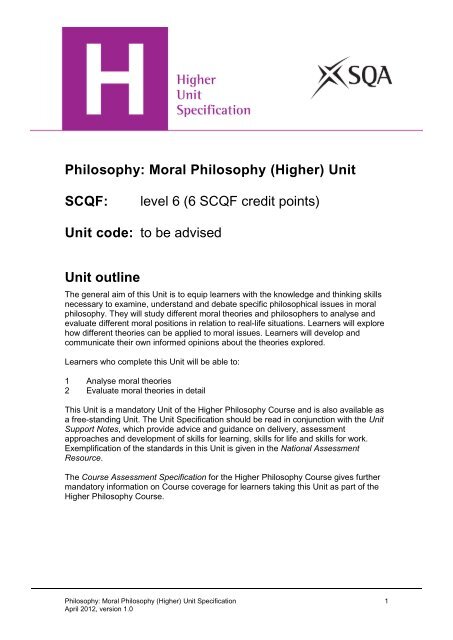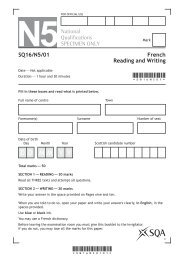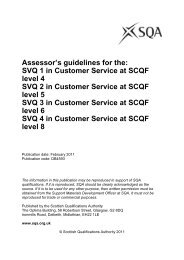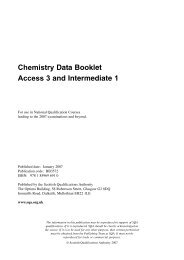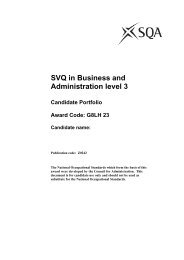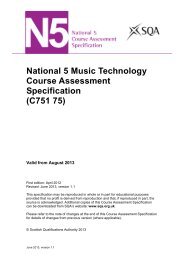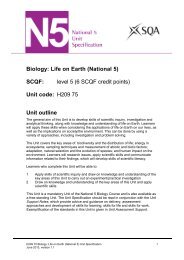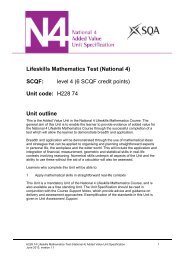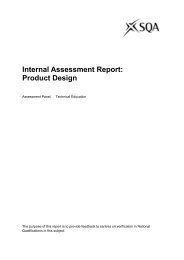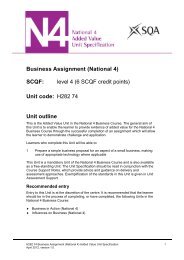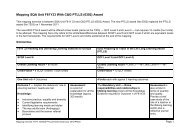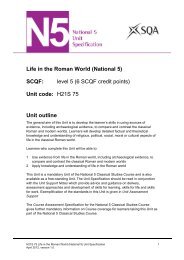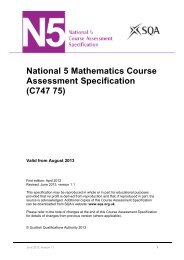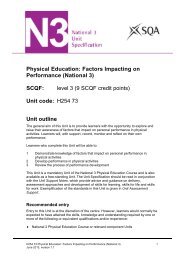Philosophy: Moral Philosophy (Higher) Unit SCQF: level 6 (6 ... - SQA
Philosophy: Moral Philosophy (Higher) Unit SCQF: level 6 (6 ... - SQA
Philosophy: Moral Philosophy (Higher) Unit SCQF: level 6 (6 ... - SQA
You also want an ePaper? Increase the reach of your titles
YUMPU automatically turns print PDFs into web optimized ePapers that Google loves.
<strong>Philosophy</strong>: <strong>Moral</strong> <strong>Philosophy</strong> (<strong>Higher</strong>) <strong>Unit</strong><br />
<strong>SCQF</strong>:<br />
<strong>level</strong> 6 (6 <strong>SCQF</strong> credit points)<br />
<strong>Unit</strong> code: to be advised<br />
<strong>Unit</strong> outline<br />
The general aim of this <strong>Unit</strong> is to equip learners with the knowledge and thinking skills<br />
necessary to examine, understand and debate specific philosophical issues in moral<br />
philosophy. They will study different moral theories and philosophers to analyse and<br />
evaluate different moral positions in relation to real-life situations. Learners will explore<br />
how different theories can be applied to moral issues. Learners will develop and<br />
communicate their own informed opinions about the theories explored.<br />
Learners who complete this <strong>Unit</strong> will be able to:<br />
1 Analyse moral theories<br />
2 Evaluate moral theories in detail<br />
This <strong>Unit</strong> is a mandatory <strong>Unit</strong> of the <strong>Higher</strong> <strong>Philosophy</strong> Course and is also available as<br />
a free-standing <strong>Unit</strong>. The <strong>Unit</strong> Specification should be read in conjunction with the <strong>Unit</strong><br />
Support Notes, which provide advice and guidance on delivery, assessment<br />
approaches and development of skills for learning, skills for life and skills for work.<br />
Exemplification of the standards in this <strong>Unit</strong> is given in the National Assessment<br />
Resource.<br />
The Course Assessment Specification for the <strong>Higher</strong> <strong>Philosophy</strong> Course gives further<br />
mandatory information on Course coverage for learners taking this <strong>Unit</strong> as part of the<br />
<strong>Higher</strong> <strong>Philosophy</strong> Course.<br />
<strong>Philosophy</strong>: <strong>Moral</strong> <strong>Philosophy</strong> (<strong>Higher</strong>) <strong>Unit</strong> Specification 1<br />
April 2012, version 1.0
Recommended entry<br />
Entry to this <strong>Unit</strong> is at the discretion of the centre. However, learners would normally be<br />
expected to have attained the skills, knowledge and understanding required by one or<br />
more of the following or equivalent qualifications and/or experience:<br />
National 5 <strong>Philosophy</strong> Course or relevant component <strong>Unit</strong>s<br />
National 5 Religious, <strong>Moral</strong> and Philosophical Studies Course<br />
Equality and inclusion<br />
This <strong>Unit</strong> Specification has been designed to ensure that there are no unnecessary<br />
barriers to learning or assessment. The individual needs of learners should be taken<br />
into account when planning learning experiences, selecting assessment methods or<br />
considering alternative evidence. For further information please refer to the <strong>Unit</strong><br />
Support Notes.<br />
<strong>Philosophy</strong>: <strong>Moral</strong> <strong>Philosophy</strong> (<strong>Higher</strong>) <strong>Unit</strong> Specification 2<br />
April 2012, version 1.0
Standards<br />
Outcomes and assessment standards<br />
Outcome 1<br />
The learner will:<br />
1 Analyse moral theories by:<br />
1.1 Comparing the main features of the moral theories in detail, making reference to<br />
appropriate philosophers<br />
1.2 Analysing how the theories respond to specific moral issues<br />
1.3 Making reference to appropriate sources that comment on or develop the<br />
theories<br />
Outcome 2<br />
The learner will:<br />
2 Evaluate moral theories in detail by:<br />
2.1 Responding to possible strengths and weaknesses of the theories<br />
2.2 Explaining how successfully the theories respond to moral issues<br />
2.3 Expressing an informed opinion on the moral theories<br />
Evidence Requirements for the <strong>Unit</strong><br />
Assessors should use their professional judgement, subject knowledge and<br />
experience, and understanding of their learners, to determine the most appropriate<br />
ways to generate evidence and the conditions and contexts in which they are used.<br />
Exemplification of assessment is provided in the National Assessment Resource.<br />
Advice and guidance on possible approaches to assessment is provided in the <strong>Unit</strong><br />
Support Notes.<br />
<strong>Philosophy</strong>: <strong>Moral</strong> <strong>Philosophy</strong> (<strong>Higher</strong>) <strong>Unit</strong> Specification 3<br />
April 2012, version 1.0
Development of skills for learning, skills for life<br />
and skills for work<br />
It is expected that learners will develop broad, generic skills through this <strong>Unit</strong>. The skills<br />
that learners will be expected to improve on and develop through the <strong>Unit</strong> are based on<br />
<strong>SQA</strong>’s Skills Framework: Skills for Learning, Skills for Life and Skills for Work and are<br />
drawn from the main skills areas listed below. These must be built into the <strong>Unit</strong> where<br />
there are appropriate opportunities.<br />
1 Literacy<br />
1.1 Reading<br />
1.2 Writing<br />
1.3 Listening and talking<br />
5 Thinking skills<br />
5.3 Applying<br />
5.4 Analysing and evaluating<br />
Amplification of these is given in <strong>SQA</strong>’s Skills Framework: Skills for Learning, Skills for<br />
Life and Skills for Work. The <strong>level</strong> of these skills should be at the same <strong>SCQF</strong> <strong>level</strong> as<br />
the <strong>Unit</strong> and be consistent with the <strong>SCQF</strong> <strong>level</strong> descriptor. Further information on<br />
building in skills for learning, skills for life and skills for work is given in the <strong>Unit</strong> Support<br />
Notes.<br />
<strong>Philosophy</strong>: <strong>Moral</strong> <strong>Philosophy</strong> (<strong>Higher</strong>) <strong>Unit</strong> Specification 4<br />
April 2012, version 1.0
Administrative information<br />
Published: April 2012 (version 1.0)<br />
Superclass:<br />
to be advised<br />
History of changes to National <strong>Unit</strong> Specification<br />
Version Description of change Authorised by Date<br />
© Scottish Qualifications Authority 2012<br />
This specification may be reproduced in whole or in part for educational purposes<br />
provided that no profit is derived from reproduction and that, if reproduced in part, the<br />
source is acknowledged. Additional copies of this <strong>Unit</strong> can be downloaded from <strong>SQA</strong>’s<br />
website at www.sqa.org.uk.<br />
Note: readers are advised to check <strong>SQA</strong>’s website: www.sqa.org.uk to ensure they are<br />
using the most up-to-date version of the <strong>Unit</strong> Specification.<br />
<strong>Philosophy</strong>: <strong>Moral</strong> <strong>Philosophy</strong> (<strong>Higher</strong>) <strong>Unit</strong> Specification 5<br />
April 2012, version 1.0


